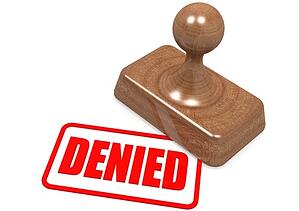Published on: November 8, 2016
 Social Security Disability Insurance (SSDI) is a great program to help individuals who have been disabled by illness, injury, or other traumas to the point of being unable to work. SSDI income helps people pay their bills and stay afloat during times of great need.
Social Security Disability Insurance (SSDI) is a great program to help individuals who have been disabled by illness, injury, or other traumas to the point of being unable to work. SSDI income helps people pay their bills and stay afloat during times of great need.
However, not every disability claim is accepted at first. There are times where the Social Security Administration (SSA) will deny a claim—which can be devastating when you’re unable to work.
In most cases, there’s a good reason why the SSA will deny a claim at first. Knowing what these reasons are before filing your own claim can help you avoid being denied, or at least let you know why you might be denied benefits.
#1: A Lack of Work History
One of the first things that the SSA checks when considering an SSDI application is the work history of the applicant. There are two tests that the SSA runs for an SSDI applicant:
- A recent work test. Depending on your age, you will need to have worked at least 50% of a given period of time prior to when you became disabled. For example, if you’re under the age of 24, you need to have worked at least 1.5 years out of the last 3 before becoming disabled. At 31 and up, you need 5 years of work out of the last 10.
- A duration of work test. This is a total time worked requirement that ranges from 1.5 years of total time worked at age 28 or less to a maximum of 9.5 years of total time worked at age 60.
The SSA’s book on Disability Benefits details a complete chart of the age and duration of work requirements. Basically, you need to have been actively in the workforce when you became disabled and the older you are, the more years in total you will need to have worked.
Some blind workers only have to meet the duration of work test.
If you don’t meet the recent work test or duration of work test, then you cannot be paid SSDI benefits. However, you may still be able to claim other benefits, such as Supplemental Security Income (SSI).
#2: Other Sources of Income
SSDI is considered a needs-based form of support for disabled workers. If you’re still able to earn money from any other sources, the SSA will consider that when determining whether or not you qualify for disability income.
This includes:
- Engaging in what the SSA calls “substantial gainful activity,” or work that involves significant mental or physical activity. In fact, being able to perform substantial gainful activity is usually grounds to deny a claim.
- Workers’ compensation benefits/pay.
- Payments from other public disability benefits programs.
- Pensions not covered by Social Security.
Some forms of income, such as pensions that are covered under Social Security, subsidized work where your pay is higher because of your disability, and some private disability benefits plans might not affect your SSDI claim.
#3: Your Condition is Temporary
One of the major requirements for claiming SSDI is that your condition is expected to last at least one year or result in your death.
Temporary conditions such as a broken arm/leg that are expected to heal in a few months are not considered disabling by the SSA, and will not pass their medical requirements. For temporary injuries, it’s often better to focus on Worker's Compensation benefits and/or legal action to cover your bills, and recovery to get back to work as soon as possible.
#4: Lack of Medical Evidence
 Many valid disability claims get denied because of a lack of medical evidence. An all-too-common mistake made by applicants is that they assume their condition is self-evident enough to automatically qualify—and they forget to give the SSA all of the documentation about their condition.
Many valid disability claims get denied because of a lack of medical evidence. An all-too-common mistake made by applicants is that they assume their condition is self-evident enough to automatically qualify—and they forget to give the SSA all of the documentation about their condition.
The SSA has to process an incredibly large number of applications each year, and they don’t always have the time and resources to hunt down paperwork to prove a condition meets their requirements.
To avoid this issue, be sure to get with your doctor and all your treatment specialists to consolidate any relevant x-rays, blood tests, evaluations, etc. that can be used to verify your disability.
#5: Lack of Communication
The SSA may need to contact you for a number of reasons prior to approving your disability claim. Beyond simply giving the SSA access to medical and financial records, you may need to undergo a consultative examination with an SSA doctor.
Additionally, routine communication is necessary to ensure that you’re actually able to receive your SSDI payments. If you have a designated representative, he/she can communicate with the SSA on your behalf, but you still need to be able to communicate with them.
If you have a change in address or phone number while applying for SSDI, be sure to inform the SSA as soon as possible to avoid an issue.
#6: Failure to Follow a Prescribed Treatment/Therapy Regimen
There are many disabling conditions that could improve with proper treatment. When a physical or mental illness could be expected to improve with treatment, it’s very important to follow your prescribed regimen whenever possible.
Failure to follow your doctor’s prescribed therapy/treatment regiment could be grounds for the SSA to deny the claim—IF the therapy could reasonably be expected to allow you to participate in substantial gainful activity.
There are some exceptions.
For example, if your condition actively prevents you from being able to follow the treatment regimen, then you might be exempted from this requirement. Other reasons you might be exempted from having to follow a regimen include:
- The treatment’s cost is beyond your means to pay for it.
- The specific treatment/therapy recommended would force you to violate your religious beliefs.
- Conflicting Medical Opinions. Another doctor disagrees with the recommended regimen (requires documentation and may be tricky).
#7: Criminal Convictions, Imprisonment, and Illegal Activity Related to the Cause of Disability
 There are some situations where criminal history or activity may impact your ability to claim SSDI (and other Social Security benefits).
There are some situations where criminal history or activity may impact your ability to claim SSDI (and other Social Security benefits).
For example, you cannot receive Social Security benefits for any month while you are in prison or certain mental institutions at the government’s expense. However, on release, you may be able to start receiving benefits.
The worst-case scenario is becoming injured to the point of disability while committing a felony that you were later convicted of. Disabilities suffered during the commission of a felony cannot be the basis for a disability claim. Other disabling conditions not incurred or worsened by criminal activity may still be considered, however.
#8: You Have Training or Experience That Would Allow You to Work a Different Job—Even with Your Disability
The SSA considers whether you have skills, training, or experience that would allow you to work a different job from the one you performed before.
For example, if you were paralyzed from the waist down and couldn’t walk, that would prevent you from doing almost any job involving heavy physical labor. However, if you had previous education or experience in accounting, you might be able to take a non-labor-intensive desk job.
If you do have other training/experience, not cooperating with the SSA’s attempts to put you to work on a trial basis could be used as grounds to terminate your benefits or deny your claim.
This also applies if your condition is only considered partially disabling by the SSA—if you could still work at a reduced capacity and exceed the earnings limit of substantial gainful activity, your claim may be denied.
What to Do if Your Claim is Rejected
If you are applying for disability benefits and get rejected, don’t give up! An initial rejection doesn’t have to be the end of the road—especially if the rejection was based on a lack of evidence or communication.
Also, there are programs other than SSDI that may be able to help you cover your costs and provide for your family.
Instead, contact an experienced Social Security disability advocate who can help you review your case and file your appeal, or point out what other programs you might need to consider.
The sooner you can get started, the better.

